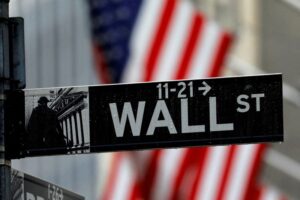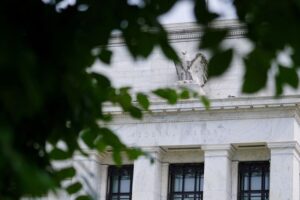Fed expected to hold rates steady, set stage for September cut

By Howard Schneider
WASHINGTON (Reuters) -The Federal Reserve is expected to leave interest rates unchanged at the end of a two-day policy meeting on Wednesday, but also indicate that a reduction in borrowing costs could come as soon as September.
Contracts tied to the U.S. central bank’s policy rate show investors are convinced a rate cut will happen at the Sept. 17-18 meeting, with the only disagreement over whether the Fed will begin easing policy with a quarter-percentage-point reduction, as most expect, or a more aggressive half-percentage-point cut, according to CME Group’s (NASDAQ:) FedWatch tool.
The Fed has kept its policy rate in the 5.25%-5.50% range for the past year.
A 50-basis-point rate cut would likely require evidence that the economy is slowing faster than expected and putting at risk the still-low, 4.1% unemployment rate.
Throughout the Fed’s more than two-year battle to tame inflation, which included the fastest rate hikes since the 1980s, the economy has grown faster and performed better than expected – and the most recent data suggests that is continuing.
The economy grew at an above-trend 2.8% annual rate in the second quarter. Job openings and hiring data released on Tuesday showed continued resilience in the job market, with the number of open positions remaining above 8 million.
The layoffs rate also dropped. The rate at which workers are quitting jobs and the ratio of unemployed people to open positions, now at 1.2, are both roughly where they were before the COVID-19 pandemic, a fact that has led Fed officials to regard the supply of and demand for workers in the economy as roughly balanced.
The employment cost index, a quarterly measure that includes wages and benefits, increased 0.9% in the second quarter, less than the 1% gain expected by economists in a Reuters poll. The reading likely will add to the sense among Fed officials that the job market and rising wages won’t stoke new price increases.
“The labor market has cooled over the last several months but isn’t weak,” said Nancy Vanden Houten, lead U.S. economist for Oxford Economics. “That’s a scenario the Federal Reserve wants to guard against, and we expect the Fed to begin cutting rates in September.”
The central bank’s new policy statement will be released at 2 p.m. EDT (1800 GMT), and Fed Chair Jerome Powell will hold a press conference half an hour later.
‘NORMALIZATION OF ACTIVITY’
Analysts say they expect Powell to emphasize that the Fed will remain “data-dependent” when it comes to its ultimate rates decision, with a larger-than-usual gap of time between now and the next meeting and more data to go along with it.
That begins with the release on Friday of the Labor Department’s employment report for July. Economists polled by Reuters on average expect firms added a still-solid 175,000 jobs this month, with the unemployment rate unchanged.
Recent data has shown inflation continuing to slow, with the headline personal consumption expenditures price index increasing at a 2.5% annual rate in June and at around 1.5% for the last three months.

The Fed targets 2% annual inflation based on the PCE price index.
“The Fed does not believe it needs to hurry” and cut rates now, said Tim Duy, chief U.S. economist at SGH Macro Advisors. After a strong initial report on second-quarter economic growth, “the data remain consistent with a normalization of activity rather than a sharper slowdown. Rate cuts at this point are still preemptive with the goal of stabilizing activity at the current near-trend pace.”





